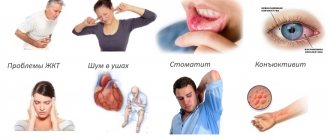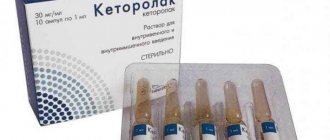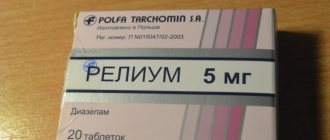Compound
- Solution - ketoprofen , propylene glycol, ethanol, benzyl alcohol, sterile water.
- Gel - ketoprofen, trolamine, carbomer , ethanol, lavender essential oil, sterile water.
- Cream - ketoprofen, isopropyl myristate, methylhydroxybenzoate, propylene glycol, propylhydroxybenzoate, white petrolatum, magnesium sulfate, elphacos ST9, propylene glycol oleate, glyceryl, water.
- Tablets - silicon dioxide, magnesium stearate, talc, corn starch, lactose, macrogol , hypromellose, titanium dioxide, indigo carmine, wax, talc.
- Capsules - ketoprofen, microcrystalline cellulose, lactose monohydrate, croscarmellose sodium, povidone, polysorbate, purified water, eudragit, triethyl citrate, talc, yellow iron oxide, purified water, silicon dioxide, titanium dioxide, gelatin.
- Suppositories - ketoprofen, solid fat, glyceryl caprylocaprate.
Release form
- Solution 50 mg/ml for intravenous and intramuscular administration - in dark glass ampoules of 2 ml, in a blister of 5 and 10 ampoules in cardboard packaging No. 10.2
- Gel 2.5% - for external use, colorless, transparent, homogeneous in an aluminum tube of 50, 100 g in a cardboard package.
- Cream 5% - for external use, homogeneous, white in aluminum tube, 30, 50 g in a cardboard package.
- Ketonal tablets 50 mg are biconvex round, film-coated in dark glass bottles of 20 pcs. in cardboard packaging.
- Capsules 50 mg with modified release - blue in blister in cardboard packaging No. 20, 30.
- Rectal suppositories are smooth, white, homogeneous in a blister of 6 suppositories in a cardboard package No. 12.
Pharmacological properties of the drug Ketonal
Pharmacodynamics. Ketoprofen is an NSAID that has analgesic, anti-inflammatory and antipyretic effects. During inflammation, ketoprofen inhibits the synthesis of prostaglandins and leukotrienes, inhibiting the activity of cyclooxygenase and partially lipoxygenase; it also inhibits the synthesis of bradykinin and stabilizes lysosomal membranes. It has an analgesic effect and eliminates the manifestations of symptoms of inflammatory and degenerative diseases of the musculoskeletal system. Pharmacokinetics. When taken orally, ketoprofen is rapidly absorbed into the gastrointestinal tract. After oral administration (50 mg 4 times a day) with meals, the maximum concentration of ketoprofen in the blood plasma is reached after 1.5 hours and is 3.9 mcg/ml, whereas when taken on an empty stomach it is 2.0 mcg/ml and is achieved after 2 hours; for extended-release tablets, the maximum concentration in the blood plasma is achieved after 4–6 hours. The bioavailability of ketoprofen in oral forms is 90–93% and is directly proportional to the dose that is used. After rectal administration of 100 mg of ketoprofen, the maximum concentration in blood plasma (10.4 μg/ml) is determined after 1.05–1.22 hours. The bioavailability of ketoprofen is 71–96%. With intravenous infusion, the average level in blood plasma 5 minutes from the start and 4 minutes after completion of the administration is 26.4 ± 5.4 μg/ml. Bioavailability is 90%. The degree of protein binding is 99%. Volume of distribution - 0.1–0.2 l/kg. Ketoprofen penetrates into the synovial fluid. A stable concentration of ketoprofen in the blood plasma is achieved within 24 hours after taking oral forms. The pharmacokinetics of ketoprofen do not differ significantly depending on the age of the patients. Cumulation of ketoprofen in tissues is not observed. Ketoprofen is extensively metabolized in the liver via microsomal oxidation. It is excreted from the body in the form of a conjugate with glucuronic acid. The half-life is 2 hours. Up to 80% of the administered dose of ketoprofen is excreted in the urine, usually (over 90%) in the form of glucuronide, about 10% in feces. In patients with renal failure, the elimination of ketoprofen is slowed down, the half-life increases by 1 hour. In patients with liver failure, ketoprofen may accumulate in tissues. In elderly patients, the metabolism and excretion of ketoprofen is slow, but this is of clinical significance only in cases of impaired renal function.
Pharmacodynamics and pharmacokinetics
Pharmacodynamics
Ketoprofen inhibits the activity of cyclooxygenase , which inhibits the process of prostaglandin .
The drug also inhibits the synthesis of bradykinin , lipoxygenase , stabilizes lysosomal membranes in the cell and suppresses the production of enzymes that are involved in the inflammatory process. Ketoprofen does not have a negative effect on the condition of articular cartilage.
Pharmacokinetics
The process of absorption of ketoprofen in the body is very slow and it practically does not accumulate in the body. Bioavailability - 5%. The drug penetrates well and reaches therapeutic concentrations in synovial fluid, muscles, ligaments, and subcutaneous tissue. Its concentration in blood plasma is insignificant. Metabolized in the liver to form conjugates. Excreted in urine. Slowly.
Impact on the body
It is described in detail in the instructions for using Ketonal injections. The solution, being a non-steroidal anti-inflammatory drug, blocks the enzymes COX-2 and COX-1, as well as lipoxygenase (partially). As a result, suppression of prostaglandin synthesis occurs (including in the central nervous system).
The substance also stabilizes liposomal membranes. And in high concentrations, the synthesis of leukotrienes and bradykinin is completely suppressed. At the same time, ketoprofen does not adversely affect articular cartilage and their condition.
Indications for use
Indications for use of various forms of the drug are identical. The choice of the form of release of the drug is based on a number of factors (type of disease, ease of administration).
The drug is prescribed in the following cases:
- Symptomatic treatment of inflammatory and degenerative diseases of the musculoskeletal system ( arthritis of various origins, osteochondrosis , osteoarthritis , gout , articular and non-articular rheumatism , myalgia , tendonitis , bursitis , neuralgia , glenohumeral syndrome, injuries of the musculoskeletal system - sprains and ruptures of ligaments, muscle bruises )
- Relief of pain syndrome in myalgia, bursitis, tendinitis, neuralgia, radiculitis, migraine , headache, algodismenorrhea , renal colic, post-traumatic pain syndrome, cancer, adnexitis , lumbago , lymphadenitis and lymphangitis , phlebitis .
Indications
"Ketonal" in ampoules can be prescribed for the purpose of symptomatic treatment of pain syndrome. In inflammatory processes, including. In general, the list of indications can be divided into the following list:
- Lesions of the musculoskeletal system, including those of a degenerative nature (osteoarthrosis).
- Postoperative or post-traumatic syndromes, including those accompanied by fever and inflammation.
- Rheumatoid arthritis.
- Gout and pseudogout.
- Arthritis of seronegative type. This may be ankylosing spondylitis (ankylosing spondylitis), Reiter's syndrome (reactive arthritis), etc.
- Pain syndrome that occurs under the following conditions: radiculitis, migraine, neuralgia, tendonitis, myalgia, bursitis. It doesn’t matter how it manifests itself - pronounced, moderate or weak - the doctor can prescribe Ketonal injections if he deems it necessary.
- Algodismenorrhea.
- Pain syndrome accompanying cancer.
The instructions for use of Ketonal ampoules note that this drug does not affect the progression of pathology in any way. Its goal is to symptomatically reduce inflammation and pain during the immediate period of use.
Contraindications
Individual hypersensitivity to the drug and other NSAIDs, bleeding disorders, childhood, liver/renal failure , chronic dyspepsia , exacerbation of peptic ulcer , ulcerative colitis , period after surgery, lactation and during pregnancy in the 3rd trimester.
Prescribe with caution if there is a history of bronchial asthma , peptic ulcer; diabetes mellitus , arterial hypertension , simultaneous use of anticoagulants , cardiovascular diseases, long-term treatment with NSAIDs, in old age.
special instructions
There are some other nuances that should be taken into account before starting treatment, namely:
- It is important during treatment to periodically donate blood and stool for analysis, as well as check the functions of the liver and kidneys. People over 65 years old are required.
- Patients with arterial hypertension and heart disease need to keep their blood pressure under control.
- If a person realizes that the drug is causing him to have problems with his eyes, he should immediately stop treatment and report his situation to the doctor.
- We must remember that ketoprofen, being an NSAID, often masks the signs of infectious and inflammatory diseases. Therefore, if during therapy your health worsens or any alarming symptoms appear, you should seek help from a doctor.
- Patients with a history of gastrointestinal problems should undergo treatment under medical supervision.
- Patients with infertility are not recommended to take Ketonal because it affects fertility.
It is important to consider that the drug slows down psychomotor reactions and sometimes impairs the ability to concentrate. Therefore, you should not drive a car or carry out any activity that requires increased attention during treatment.
Side effects
Side effects of the drug can manifest as disturbances in different body systems:
- anaphylactic reactions;
- anemia , leukopenia , thrombocytopenia , agranulocytosis , bone marrow function disorders;
- asthenia , insomnia, depression , drowsiness, dizziness, headache, convulsions, confusion;
- tinnitus, eye pain, blurred vision, conjunctivitis , hearing loss;
- tachycardia , increased blood pressure, heart failure;
- nosebleeds, bronchospasm , rhinitis , laryngeal edema;
- nausea, dyspepsia , pain in the abdomen, gastritis , constipation , diarrhea ;
- hepatitis;
- skin itching and rash, photosensitivity;
- urethritis , cystitis , hematuria ;
- peripheral edema, fatigue;
- weight gain, thirst, shortness of breath .
Side effects of the drug Ketonal
As usual, transient. Most often, gastrointestinal disorders are observed (digestive disorders, dyspepsia, nausea, vomiting, constipation, diarrhea, heartburn, abdominal pain). Rarely - headache, dizziness, confusion, hypersomnia, drowsiness, swelling, mental changes, insomnia. In isolated cases, possible ulcerative stomatitis, ground, hematemesis, peptic ulcer, gastrointestinal hemorrhage or perforation, gastritis, duodenal and stomach ulcers. From the blood system: rarely - anemia, hemolysis, purpura, thrombocytopenia, agranulocytosis. High doses of ketoprofen can inhibit platelet aggregation, thereby prolonging bleeding time, and cause epistaxis and hematoma formation. From the immune system: asthma, bronchospasm or shortness of breath (especially in patients with hypersensitivity to acetylsalicylic acid and other NSAIDs); very rarely - angioedema and anaphylaxis. Mental disorders: common - depression, nervousness, nightmares, drowsiness; rarely - delirium with visual and auditory hallucinations, disorientation, dyslalia. From the side of the central nervous system: often - headache, asthenia, discomfort, increased fatigue, weakness, dizziness, paresthesia; very rarely - there have been isolated reports of cases of pseudotumor cerebri. From the organ of vision: often - visual impairment; very rarely - conjunctivitis. On the part of the hearing organ: common - tinnitus. From the cardiovascular system: often - edema; rarely - heart failure, hypertension (arterial hypertension). Clinical studies and epidemiological evidence suggest that a small increased risk of arterial thrombotic events (eg, myocardial infarction and stroke) may be associated with the use of some NSAIDs (especially at high doses and long-term use). There is insufficient data to exclude such a risk for ketoprofen. From the respiratory system: uncommon - hemoptysis, shortness of breath, pharyngitis, rhinitis, bronchospasm, laryngeal edema (signs of an anaphylactic reaction); rarely - asthma attacks. From the gastrointestinal tract: very - dyspepsia; often - nausea, abdominal pain, diarrhea, constipation, flatulence, anorexia, vomiting, stomatitis; very rarely - colitis, intestinal perforation (as complications of diverticula), exacerbation of ulcerative colitis or Crohn's disease, enteropathy with perforation, stenosis. Enteropathy may be accompanied by mild bleeding with loss of protein. There have been case reports of rectal perforation in elderly women. Peptic ulcers, perforation or gastrointestinal bleeding may occur, sometimes fatal, especially in elderly patients. Ulceration, hemorrhage or perforation may develop in 1% of patients after 3–6 months of treatment or in 2–4% of patients after 1 year of treatment with NSAIDs. Melena, bloody vomiting, and exacerbations of ulcerative colitis or Crohn's disease have been reported after use. Gastritis was rarely observed. From the hepatobiliary system: very rarely - severe liver dysfunction, which is accompanied by jaundice and hepatitis. Skin disorders: common - skin rash; in isolated cases - alopecia, eczema, purple-like rash, increased sweating, urticaria, exfoliative dermatitis; rarely – photosensitivity, photodermatitis; very rarely - bullous reactions, including Stevens-Johnson syndrome and toxic epidermal necrolysis. From the urinary system: very rarely - acute renal failure, interstitial nephritis, nephrotic syndrome, acute pyelonephritis. From the reproductive system: very rarely - menometrorrhagia. Laboratory indicators: very often - deviation from the norm in liver function tests; rarely - during treatment with NSAIDs, ALT and AST levels increase significantly. Ketoprofen reduces platelet aggregation, thereby prolonging bleeding time.
Instructions for use of Ketonal (Method and dosage)
Ketonal tablets, instructions for use
Take 1 tablet Ketonal (50 mg) orally twice a day or Ketonal Forte (100 mg), swallowing whole and drinking at least 100 ml of liquid (water, milk) after meals.
The maximum daily dose of the drug should not exceed 200 mg per day. In this case, Ketonal tablets can be combined with other forms of the drug (cream, suppositories). You can take extended-release tablets (Ketonal Retard) - 150 mg (1 tablet) once a day.
Cream Ketonal, instructions for use
Apply a little 5% cream (3–5 cm) to the skin and lightly rub Ketonal cream 2–3 times a day into problem areas of the body. The duration of self-treatment should not exceed two weeks. If there is no effect, you should contact a specialist. Sometimes patients mistakenly say “ointment” when referring to the cream.
Gel Ketonal, instructions for use
The gel is applied similarly to the cream. The dosage of the gel must be selected in accordance with the area of the problem area. Approximate dosage - 5 cm of gel corresponds to 100 mg of Ketonal.
Ketonal capsules, instructions for use
For arthritis, dysmenorrhea, osteoarthritis and mild or moderate pain syndrome, take one capsule orally with meals, with milk or water every six hours. Can be used in combination with injection solution, suppositories, taking into account the maximum daily dose. Concomitant use with antacids .
Ketonal injections, instructions for use
For parenteral use, the drug is administered as an intramuscular injection in an amount of 100 mg 1–2 times a day. IV infusion: the procedure is carried out in a hospital setting. Short infusion - ketoprofen in ampoules (100–200 mg) is diluted in a solution of 0.9% sodium chloride (100 ml) and administered over one hour, repeated administration no earlier than eight hours later. For continuous infusion, the drug (100–200 mg) is diluted in 500 ml of Ringer's solution or 0.9% sodium chloride and administered over eight hours. Ketonal IV can be administered together with centrally acting analgesics .
Ketonal suppositories, instructions for use
Rectal suppositories are inserted into the rectum, as deeply as possible, one suppository 1-2 times a day. You can combine the administration of suppositories with oral forms of the drug (tablets, capsules).
Composition and price
Before moving on to the instructions for using Ketonal injections, we need to discuss general issues. So, this drug is a colorless or slightly yellow clear solution that is injected into a vein or muscle.
The active ingredient is ketoprofen. It contains 50 mg in 1 ml, and 100 mg in one ampoule. There are auxiliary elements: ethanol, propylene glycol, water for injection and benzyl alcohol.
The price of a package with ten ampoules is approximately 245 rubles.
It is also worth knowing that this drug is available not only in the form of an injection solution. "Ketonal" can be found in the form of rectal suppositories, gel for external use, capsules, tablets (film-coated and prolonged action), as well as cream.
Interaction
Ketoprofen reduces the effectiveness of antihypertensive drugs and diuretics , enhances the effect of hypoglycemic oral drugs and a number of anticonvulsants ( phenytoin ).
Concomitant use with anticoagulants , antiplatelet agents and thrombolytics increases the risk of bleeding. Taking Ketonal with salicylates , other NSAIDs , ethanol and corticosteroids increases the risk of developing gastrointestinal complications.
Ketonal increases the concentration in the blood of lithium drugs , cardiac glycosides , CCBs , methotrexate , cyclosporine , and when administered simultaneously with potassium-sparing diuretics , ACE inhibitors , tacrolimus , low molecular weight heparins and trimethoprim hyperkalemia increases .
Ketonal's analogs
Level 4 ATC code matches:
Voltaren Emulgel
Ultrafastin
Indomethacin
Dicloran
Dicloran Plus
Dolgit
Nise
Ketorol
Febrofeed
Fastum gel
Diclofenac
Finalgel
Bystrumgel
Deep Relief
Butadion
Diklovit
Artrosilene
Olfen
Fanigan Fast
Methindol
Analogs of Ketonal in tablets and capsules - Artrum , Ketoprofen , Indomethacin , Ibuprofen , Osteoartisi Active Plus , Artron Complex , Flamax Forte , Denebol , Ketoprofen MV , Chondra-Sila , Flexen , Bystrumkaps , Oruvel , Ultrafastin , Profenid and others.
Analogues of Ketonal in the form of a solution are Artrosilene , Diclofenac , Denebol , OKI , Emodol , Oruvel , Flamax , Flexen , Chondrolone and others.
Analogs of cream and gel Ketonal - Artrosilen , Ketoprofen , Voltaren , Febrofid , Bystrumgel , F-gel , Fastum- , Ketoprom , Oruvel , Ketum-gel , Reanimator Thermo-gel , Valusal , Arthropod , Ultrafastin , Fort-gel , Profenid , Flexen .
Analogues of Ketonal in the form of suppositories are Artrum , Oruvel , Flexen , Artrosilen .
The price of analogues may differ significantly from the cost of Ketonal. When replacing the drug, you should consult a specialist.
Reviews about Ketonal
On the Internet you can find numerous reviews about Ketonal, mostly favorable. The most favorable reviews about Ketonal in tablets and injections:
- “... I had a kidney stone pass, hellish pain, neither baralgin nor other analgesics helped. The emergency doctor gave Ketonal injections and the pain went away almost immediately. An excellent pain reliever, not a narcotic and affordable.”
- “... I had a tooth removed. During extraction, the tooth crumbled and when they began to pull out the roots, there was hellish pain. But after the Ketonal injection I stopped feeling pain. A good cure for toothache."
- “... I suffer from osteochondrosis, for which I take Ketonal tablets and use cream, it helps a lot.”
Many patients leave good reviews about Ketonal cream and often call it “ointment”: “...my mother has been using Ketonal ointment for arthrosis for quite a long time. The drug relieves pain in the knee joints well and quickly. It’s not the cheapest drug, but it’s very effective.”
There are also negative reviews: “... I ride a horse. After the fall, my ankle began to hurt severely. I used the cream for a month. It didn’t help, the joint continued to hurt. We got “horse balm” at the hippodrome – excellent results.”
Those who are not familiar with the drug ask the question: “what is Ketonal ointment for?” It is successfully used for injuries to the ligamentous apparatus and muscles, which is very important for people leading an active lifestyle. What else can the ointment be used for? Local treatment in the forms of cream, ointment, gel is very effective for inflammation of the veins (phlebitis). In this case, NSAIDs are prescribed in parallel with venotonics and thrombolytics.
Reviews about the gel are also positive, and it is noted that this dosage form is absorbed more easily and quickly, without leaving marks on the skin and clothing; the use of the gel is more economical.
There are also numerous positive reviews about suppositories in gynecology: “... For me, the beginning of the menstrual cycle is almost always accompanied by severe pain. Whatever I drank. The emergency doctor recommended Ketonal suppositories and the pain subsided. Of course, the application procedure is not very pleasant. After inserting the suppository, I feel some discomfort (slight burning and itching), but they quickly relieve the pain and the effect lasts the whole day. Excellent product."
Reviews
A little attention should be paid to the comments of people who have used Ketonal in accordance with the intended purpose and instructions for use. Many people had to give injections intramuscularly and intravenously, and here is what former patients say about the effectiveness of this remedy:
- After injecting the solution into the muscle, the pain goes away quickly - the effect occurs in about 15 minutes. And this is much faster than taking pills.
- Inflammation also begins to subside over time. The main thing is to maintain a rest regime, especially after taking the drug. Because due to its effects, pain is not felt, and you can unknowingly put a high load on the injured joint/muscle, as a result of which the condition will worsen.
- According to patient observations, the medicine provides additional effects. For example, it also relieves related troubles: dental pain, menstrual pain, headaches, fever, malaise, etc.
- The injection does not need to be coordinated with food intake, which is very convenient for use.
- There is no discomfort during insertion.
- To open the ampoule itself, you do not need a nail file.
And there are many such comments. This allows you to verify the effectiveness of the drug. The main thing is to treat it in accordance with the recommendations of your personal physician and get checked regularly. And if intravenous treatment is prescribed, then this will not be required - such procedures are performed in a hospital setting, so everything will be under control.
Ketonal price, where to buy
The price of Ketonal depends on the form of the drug.
The price of Ketonal in injections (ampoules 2 ml 100 mg) No. 10 varies from 230 to 305 rubles per pack; Ketonal ampoules No. 50 – 957 – 1490 rubles.
The price of Ketonal in tablets 100 mg No. 20 ranges from 200 to 210 rubles; tablets Ketonal Retard 150 mg No. 20 –235 – 302 rubles.
The cost of Ketonal in capsules 50 mg No. 25 is 105 – 115 rubles.
The price of Ketonal cream 5% in a 30 g tube varies from 230 to 297 rubles; 50 g – from 310 to 395 rubles.
The price of Ketonal gel 2.5% in a 100 g tube ranges from 338 to 466 rubles per package.
The price of Ketonal in candles No. 12 pieces varies from 283 to 345 rubles.
You can purchase medications without difficulty in most pharmacies in Moscow and other cities.
- Online pharmacies in RussiaRussia
- Online pharmacies in UkraineUkraine
- Online pharmacies in KazakhstanKazakhstan
ZdravCity
- Ketonal capsules 50 mg 25 pcs. Lek dd
RUB 101 order - Ketonal active granules for the preparation of a solution for oral administration 40 mg pack. 1g 12 pcs. Fine Foods & Pharmaceuticals N.T.M. S.p.A.
164 RUR order
- Ketonal r/r i.v. and i.m. 50mg/ml amp. 2ml №5Lek dd
108 RUR order
- Ketonal solution for intravenous and intramuscular administration. 50mg/ml 2ml 10 pcs. Lek dd
RUB 208 order
- Ketonal cream 5% 30gLek dd/Salutas Pharma GmbH
RUB 276 order
Pharmacy Dialogue
- Ketonal 2.5% gel 50gLek
RUB 367 order
- Ketonal cream (tube 5% 30g)Salutas Pharma GmbH
330 rub. order
- Ketonal Duo (caps. 150 mg No. 30)Lek
RUB 244 order
- Ketonal (amp. 50 mg/ml 2 ml No. 10)Lek
RUB 236 order
- Ketonal cream (tube 5% 30g)Lek
RUB 323 order
show more
Pharmacy24
- Ketonal 100 mg 2 ml No. 10 injection solution Lek pharmaceutical company d.d., Slovenia
204 UAH.order - Ketonal forte 100 mg No. 20 tablets Lek pharmaceutical company d.d., Slovenia
133 UAH order
- Ketonal 100 mg No. 12 suppositories Lek pharmaceutical company d.d. Slovenia / Sandoz Ilac Sanay ve Ticaret A.S., Turecchina
149 UAH order
- Ketonal retard 150 mg No. 2 tablets Lek pharmaceutical company d.d., Slovenia
182 UAH order
- Ketonal 2.5% 50 g gel Salutas Pharma GmbH, Nimechchina
93 UAH order
PaniPharmacy
- Ketonal capsule Ketonal capsules 50 mg No. 25 Slovenia, Lek
117 UAH. order
- Ketonal suppository Ketonal suppository 100 mg No. 12 Slovenia, Lek
152 UAH order
- Ketonal retard tablets Ketonal retard tablets 150 mg No. 20 Slovenia, Lek
198 UAH order
- Ketonal duo capsule Ketonal DUO capsules 150 mg No. 20 Slovenia, Lek
192 UAH order
- Ketonal forte tablets Ketonal forte film-coated tablets 100 mg No. 20 Slovenia, Lek
144 UAH order
show more






